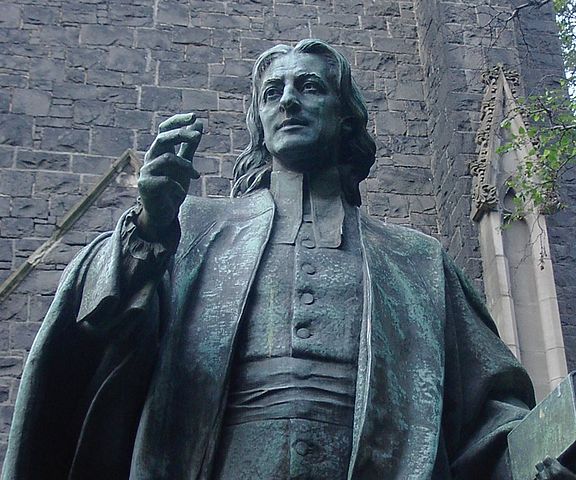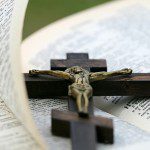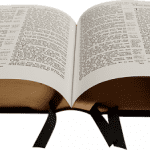
Statue of John Wesley by Paul Raphael Montford (1868-1938), in Melbourne. Photo by Adam Carr (December 2005) [public domain / Wikimedia Commons]
*****
1) From umc.org, the official site for the United Methodist Church:
FAQ Belief
What happens immediately after a person dies?
Question: What happens immediately after a person dies? Do they go directly to heaven or hell or do they go to a holding place until Christ returns to earth for the final judgment?
Answer: The basic beliefs of United Methodists can be found in the Book of Discipline in Our Doctrinal Standards and General Rules. However, mention of “hell” and “heaven” as serious afterlife issues cannot be found in this section or any other part of the Book of Discipline.
Methodist Doctrine: The Essentials by Ted A. Campbell says, “The Methodist Articles of Religion, following the teachings of the Reformation, rejected the medieval Catholic idea of purgatory as a place where the souls of those who have died in Christ could be aided or helped by the prayers of the living. John Wesley himself believed in an intermediate state between and the final judgment [sic], where those who rejected Christ would be aware of their coming doom (not yet pronounced), and believers would share in the “bosom of Abraham” or “paradise,” even continuing to grow in holiness there. This belief, however, is not formally affirmed in Methodist doctrinal standards, which reject the idea of purgatory but beyond that maintain silence on what lies between death and the last judgment.”
[ link ]
2) From The United Methodist Portal website:
United Methodists have no official doctrine on “heaven” or “hell” except for this confessional statement: “We believe in the resurrection of the dead, the righteous to life eternal and the wicked to endless condemnation.” . . .
John Wesley believed in the intermediate state between death and the final judgment “where believers would share in the ‘bosom of Abraham’ or ‘paradise,’ even continuing to grow in holiness there,” writes Ted Campbell, a professor at Perkins School of Theology, in his 1999 book Methodist Doctrine: The Essentials (Abingdon). That view has not been officially affirmed by the church.
(“Heavenly minded: It’s time to get our eschatology right, say scholars, authors,” Robin Russell, 6 April 2009)
3) From John Henry Overton (1835-1903), John Wesley, Boston and New York: Houghton, Mifflin & Co. / The Riverside Press, Cambridge, 1891, p. 39:
“1756, November 1, was a day of triumphant joy, as All Saints’ Day generally is. How superstitious are they who scruple giving God solemn thanks for the lives and deaths of His saints!
“1767, November 1. Being All Saints’ Day (a Festival I dearly love) . . . ” . . .
He always made a point of preaching on “The Communion of Saints” on All Saints’ Day. He thoroughly realized the doctrine of the Intermediate State, and to his dying day used to speak of his departed Christian friends, not as “having gone to heaven,” in the popular phraseology, but as being in Paradise, or in Abraham’s bosom.
4) Letter to John Wesley (26 March 1770) from Calvinist Anglican Augustus Toplady (1740-1778):
You affect to be deemed a minister of the national Church. Why then do you decry her doctrines, and, as far as in you lies, sap her discipline? That you decry her doctrines needs no proof: witness, for example, the wide discrepancy between her decisions and yours on the articles of freewill, justification, predestination, perseverance, and sinless perfection; to say nothing concerning your new-fangled doctrine of the intermediate state of departed souls.
5) Letter of John Wesley to Miss B (17 April 1776), from The Works of the Rev. John Wesley, Vol. X: Tracts and Letters on Various Subjects, New York: J. & J. Harper, 1827, p. 322:
But what is the essential part of heaven? Undoubtedly it is To see God: To know God: To love God. We shall then know both his Nature, and his works of creation and providence, and of redemption. Even in paradise, in the intermediate state between death and the resurrection, we shall learn more concerning these in an hour, than we could in an age, during our stay in the body. We cannot tell indeed how we shall then exist, or what kind or organs we shall have: the soul will not be encumbered with flesh and blood; but probably it will have some sort of ethereal vehicle, even before God clothes us “with our nobler house of empyrean light.”
6) Albert C. Outler (1908-1989), John Wesley: Folk-Theologian, Theology Today, Vol. 34, No. 2, July 1977:
His lively discussions of “the intermediate state” are integral to his eschatology as a whole.
[footnote: Cf., e.g., his sermon “Of Hell,” 1.4; “The Trouble and Rest of Good Men,” Proem., II.6; “The Rich Man and Lazarus,” 1.3; “On Worldly Folly,” II.6; “On Faith” (Heb. 11:1), 4.]
7) Karen B. Westerfield Tucker, American Methodist Worship, Oxford University Press, 2001, p. 202:
Decisions made during life were therefore inseparably connected to what came after life. Upon death, according to Wesley, the souls of the deceased would enter an intermediate, penultimate state in which they would remain until reunited with the body at the resurrection of the dead. In that state variously identified as “the ante-chamber of heaven,” “Abraham’s bosom,” and “paradise,” . . .
8) Douglas P. Finkbeiner, “Interpreting Luke 16: Abraham, Lazarus, and the Rich Man — Parable or History?”:
John Wesley on the parable–
But is the subsequent account merely a parable, or a real history? It has been believed by many, and roundly asserted, to be a mere parable, because of one or two circumstances therein, which are not easy to be accounted for. In particular, it is hard to conceive, how a person in hell could hold conversation with one in paradise. But, admitting we cannot account for this, will it overbalance an express assertion of our Lord: “There was,” says our Lord, “a certain rich man.” — Was there not? Did such a man never exist? “And there was a certain beggar named Lazarus.”- -Was there, or was there not? Is it not bold enough, positively to deny what our blessed Lord positively affirms? Therefore, we cannot reasonably doubt, but the whole narration, with all its circumstances, is exactly true. And Theophylact (one of the ancient commentators on the Scriptures) observes upon the text, that, “according to the tradition of the Jews, Lazarus lived at Jerusalem.













